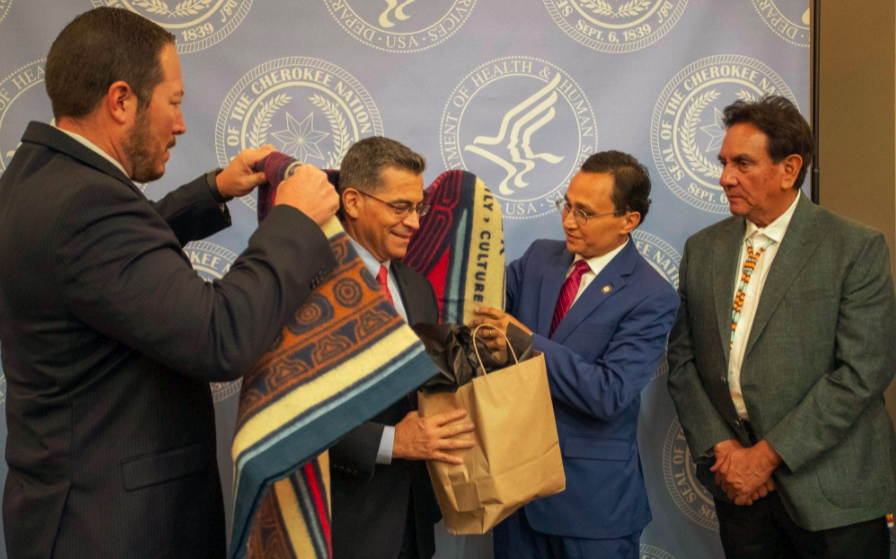
- Details
- By Chuck Hoskin Jr
Earlier this month, I was proud to host a member of the Presidential Cabinet and other top U.S. health care officials in the Cherokee Nation. U.S. Health and Human Services Secretary Xavier Becerra, Center for Medicare and Medicaid Services Administrator Chiquita Brooks-LaSure, Indian Health Service Acting Director Elizabeth Fowler and White House Council on Native American Affairs Executive Director Morgan Rodman came for a special visit on July 1. This marked Secretary Becerra’s first official visit to a tribal reservation, on the same day as the state of Oklahoma’s expansion of Medicaid took effect.
Deputy Chief Bryan Warner and I joined these federal leaders, as well as other tribal, health care and nonprofit leaders, for an engaging discussion of Oklahoma’s recent expansion of Medicaid and our shared efforts to improve the health of Cherokees and all Oklahomans.
Want more Native News? Get the free daily newsletter today.
We celebrated the successful Medicaid expansion that in the first few weeks has already enrolled more than 1,100 of our health system’s patients and more than 120,000 patients statewide. Now all Oklahomans earning up to 138% of the federal poverty level (about $36,000 for a family of four) can sign up for SoonerCare, the state’s Medicaid program. This means more Cherokee and Oklahoma families have financial peace of mind and better access to care for serious health problems.

Cherokee Nation Health System is the largest tribally operated health care system in the United States, with more than 1.4 million patient visits annually. We estimate that Oklahoma voters’ expansion of Medicaid will have a $27 million impact on our reimbursements for care, and we will reinvest that money to provide even more and better care for our patients.
All over Oklahoma, tribal, rural and urban health care providers and their patients are seeing similar benefits. Expanding Medicaid has closed some big gaps in access to care that had been holding our state back for far too long. I am grateful for the dedication of advocates who worked for years to achieve this expansion, as well as for the wisdom of Oklahoma voters who saw that refusing billions in federal funds for health coverage was doing our state economy and people a great disservice.
During the visit, Secretary Becerra and CMS Administrator Brooks-LaSure also toured our health centers and met one-on-one with Cherokee families and health care providers to talk about the importance of the federal government upholding its trust responsibilities to Indian Country. We discussed Cherokee Nation’s COVID-19 vaccination efforts, plans to build drug treatment facilities and physical wellness centers throughout the reservation, and our tribe’s historic partnership with Oklahoma State University to establish the first tribally affiliated college of medicine.
Tribal nations are sovereign governments that should always be included in policy discussions about issues that affect us. It is encouraging to see the Biden-Harris administration make this collaboration a priority. When we work together in good faith, there are no limits on what we can do for our people.
As Principal Chief of the Cherokee Nation, I am proud to see our nation’s health care accomplishments recognized at the highest levels of the U.S. government. Cherokee Nation has proven the benefits of investing in health care during the good times to be ready when a pandemic or recession strikes. We must continue to make it a priority for health care to be universally accessible for our citizens. This foundation of good health and financial protection against health emergencies empowers Cherokees to grow economically and pursue our dreams.
Chuck Hoskin, Jr. is the principal chief of the Cherokee Nation.
More Stories Like This
Sanctuary Cities Under Siege: When Federal Power Becomes a Weapon Against the PeopleDenmark's Genocidal Practices in Greenland
Cherokee Nation Stands Against Predatory Lending
Tribes Seek Better Data, Real Accountability in MMIP Cases Ahead of Tribal Consultation
What Would Dr. King Say About ICE?
Help us defend tribal sovereignty.
At Native News Online, our mission is rooted in telling the stories that strengthen sovereignty and uplift Indigenous voices — not just at year’s end, but every single day.
Because of your generosity last year, we were able to keep our reporters on the ground in tribal communities, at national gatherings and in the halls of Congress — covering the issues that matter most to Indian Country: sovereignty, culture, education, health and economic opportunity.
That support sustained us through a tough year in 2025. Now, as we look to the year ahead, we need your help right now to ensure warrior journalism remains strong — reporting that defends tribal sovereignty, amplifies Native truth, and holds power accountable.
 The stakes couldn't be higher. Your support keeps Native voices heard, Native stories told and Native sovereignty defended.
The stakes couldn't be higher. Your support keeps Native voices heard, Native stories told and Native sovereignty defended.
Stand with Warrior Journalism today.
Levi Rickert (Potawatomi), Editor & Publisher
